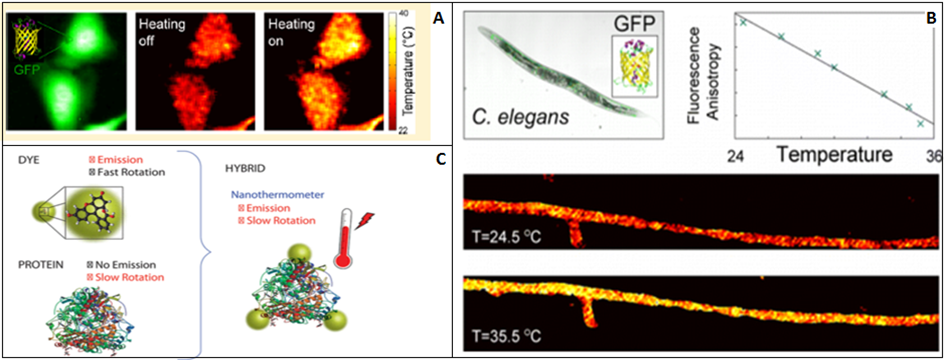Open the Blood Brain Barrier using the last advances in nanothermometry
RESEARCH PROGRAMME
P3: Nanotechnology for healthcare
PhD PROJECT DESCRIPTION
Therapeutic drug delivery to the brain remains an unsolved challenge that limits the treatment of neurological and brain diseases, such as Glioblastoma, Parkinson and stroke. The main limitation is in the ability of the therapeutic drugs to cross the Blood Brain Barrier (BBB). To overcome this limitation, scientists present hyperthermia as an interdisciplinary approach. Although this approach shows promising results, the studies were not focused on understanding and combining the temperature raise during the BBB opening. Thus, the possibility of using this temperature rise to both improve the BBB opening performance and to exploit it to treat glioblastoma is not used. For the aforementioned to be actualized, this project will bring the latest advances in intracellular and extracellular temperature and nano-thermometry to a deeper understanding of the role of temperature in the BBB opening and its possible utilization in the treatment of glioblastoma.
The PhD project includes the collaborations with several European groups: (1) Dr. Efeyan A. – CNIO, (2) Prof. Francisco Monroy Muñoz – Universidad Complutense, (3) Dra. Jana Nieder INL, Portugal and a Secondment in the laboratory of Prof. Alejandro Adam at Albany Medical College (USA) and Co-Founder of Praxis Biotechnology, Inc.
The effort of the principal investigator and his collaborators aims to achieve the following objectives: (1) detailed studies and understanding of both the intracellular temperature and extracellular temperature needed for the BBB opening and (2) design and synthesis of the nano-complex for simultaneously BBB opening and the release “in real time and on demand” of therapeutic drugs for glioblastoma treatment in vivo. The outcome of this proposal will represent an important step forward in the field of brain drug delivery, that will not only improve the applications of nanotechnology in glioblastoma treatment but will also facilitate the overcoming of the actual limitations in the treatment of different brain diseases.

Figure 1. A: In vitro Intracellular temperature measurements of Hela cells. B In vivo Intracellular temperature measurements in neurons in C. elegans. C Method presented by the candidate to convert any proteins and dyes in nanothermometers.
APPLICANT’S REQUIREMENTS
The ideal candidate should demonstrate enthusiasm for conducting their PhD thesis within an interdisciplinary research milieu, incorporating Molecular Biology, Nanotechnology, and cutting-edge Microscopy techniques. Applicants with backgrounds in Chemistry, Biology, or Physics are encouraged to apply, fostering diverse perspectives. Proficiency in English is imperative, as it is the primary language of communication at Dr. Thompson’s Laboratory, ensuring effective collaboration and dissemination of research findings.
RESEARCH GROUP DESCRIPTION
Dr. Thompson’s laboratory specializes in intracellular and extracellular temperature measurements, dedicated to advancing cancer diagnosis and treatment. Having pioneered breakthroughs in the last five years, the lab has developed a methodology to transform biomolecules (proteins, DNA) into nanothermometers. Together with that, Dr Thompson laboratory is aiming to develop nanoparticles capable of generating heat and measuring temperature simultaneously (NANOHEATERS). By integrating state-of-the-art microscopy, molecular biology, and nanotechnology, Dr. Thompson’s laboratory conducts groundbreaking interdisciplinary research at the forefront of scientific innovation.
Techniques employed include:
- Intracellular and extracellular temperature imaging
- Design of gold and magnetic nanoparticles
- Cell culture using both cancer and non-cancer cell lines.
- Microscopy techniques including TIRF and Superresolution.
RESEARCH SUPERVISOR
Dr. Sebastian Thompson
sebastian.thompson@imdea.org
Research Group website: https://www.nanociencia.imdea.org/home-en/people/item/sebastian-thompson-parga
Other websites: https://www.thompson-lab.net/
